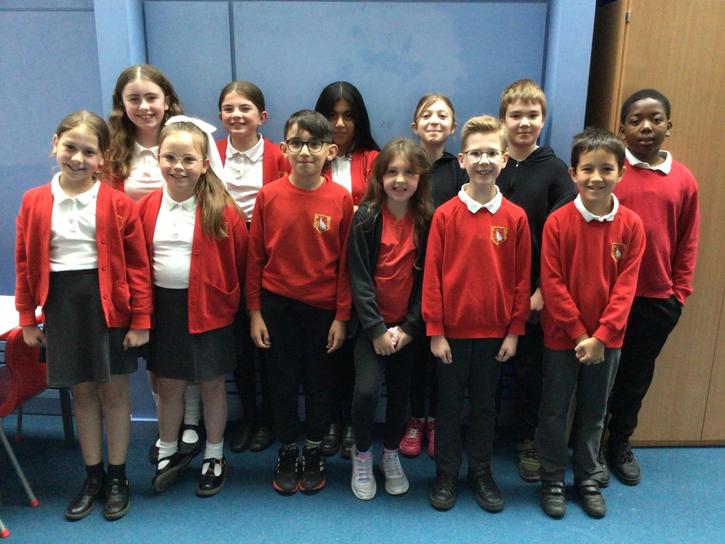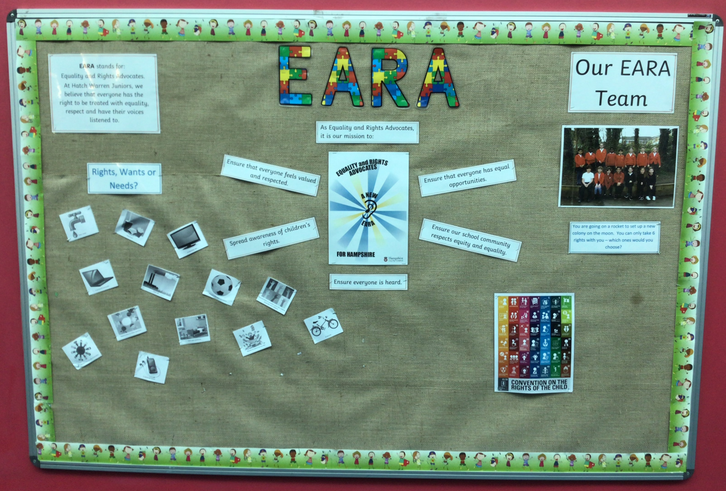Diversity and Inclusion
Subject leaders: Mr Hartley / Mr Cocks
At Hatch Warren Junior School, we are part of Basingstoke's Inclusion and Diversity programme. This is so we can prepare the children to make positive contributions to our society and show mutual respect for one another.
We are working hard at the moment to promote The United Nations Convention for the Rights of the Child (UNCRC). The children are taught about their rights from the convention and we are beginning to support the teaching of these rights through our broad curriculum. Through exploring this document, not only are we actively promoting Fundamental British Values, we are encouraging the acceptance of difference.
Why have we joined the B&DIDP partnership?
1. We believe our world is a wonderful place, and our diversity is to be celebrated. It enriches us and makes us stronger and more interesting; our differences should actually bring us together! Part of our school vision states that… “We are a fully inclusive school; we welcome children of all backgrounds, beliefs, cultures and circumstances. We recognise and celebrate our differences, too. God loves us unconditionally, and made us all unique. Therefore, every single child and adult in our community is special.” …. “We love to work with our whole community; indeed, we were made to live in community with one another. Everyone has a part to play in educating our children including parents, governors, staff, members of our local community, and organisations in our own country and around the world. And as we help our children, so we help one another and build a better, more richly-connected world. “It takes a whole village to raise a child.” We want to use the opportunity of the B&DIDP programme to strengthen the outworking of our vision.
2. For the 16% of our children who are not White-British, we have to empower them to see that they have every opportunity and every right to succeed, achieve and enjoy. We want them to flourish in our school community, to see themselves as equal and not disadvantaged in any way. We want them to feel proud of their culture, their background, their skin colour, their hair style, and their way of life, where that may appear different to the other 84%. We want them to learn about amazing scientists and important figures in history who represent their diversity. We want them to take their rightful place in contributing to our society at every level and in every way. We also want our curriculum itself to be diverse and inclusive, and for our children to study amazing people who may share their skin colour, have a similar accent, or come from their country of family origin. What about our class reader books? Are our stories all about white children? And our assembly discussions? And the countries we study in geography? And the inventors we study in D&T? We want our entire curriculum offering to be intentionally promoting and celebrating all of the diversity and beauty and success represented in our world.
3. For the 84% of our children who are classed as White-British, and who live in our mainly White-British community, they need to understand that the world is a very diverse place, and if they step outside their immediate Basingstoke community, they would see the world as it really is. We must help them to realise the beauty in our difference, as well as the equality in our difference. We want them to also be in a place to stand up for the injustice and inequality that exists in our world, and to play their part in creating a more just, fair and equal society. We have to purposefully educate them that the world isn’t representative of the world that they see in our school, and that every person, irrespective of their ethnicity, religion, culture, identity or otherwise has every chance to flourish, enjoy and make a difference.
With a desire to strengthen our approach to these three areas, we felt that the B&DIDP programme was a great vehicle to do just that – and to do it alongside other Basingstoke organisations and schools. We couldn’t do it alone … it takes a whole community to raise a child.
What are our primary aims through the B&DIDP programme?
1. Ensure that our curriculum is explicit and purposeful in embedding learning opportunities about diversity, so that children of diverse backgrounds see themselves as important, valued, and having every opportunity to be successful.
2. All children develop a strong sense of courageous advocacy in order that they stand up for injustice, whether in the classroom, on the playground, more widely in our school, in our community, or in our world. This includes strengthening pupil voice in our school, particularly where it has been hindered by COVID bubbles.
Finally it’s worth stating that this isn’t a ‘project’; it’s not something to last for a year and then drop when a new priority comes along. We have a moral duty to educate all of our children that they are loved, they are valued, they can all be successful, and that they can make a difference to each other and in our world.
EARA – Equalities and Rights Advocates


Our Mission Statement:
EARA stands for Equalities and Rights Advocates. At HWJS, we believe that everyone has the right to be treated with equality, respect, and have their voices listening to. As EARAs, it is our mission to:
- Ensure everyone is heard.
- Ensure that everyone feels valued and respected.
- Spread awareness of children’s rights.
- Ensure that everyone has equal opportunities.
- Ensure our school community respects equity and equality
Our EARA team have identified these rights to focus on for our Autumn 1 projects:
- Year 3 - UK and Map Skills: You have the right to an identity (Article 7)
- Year 4 - Anglo-Saxons: You have the right to be protected from being hurt or badly treated (Article 19)
- Year 5 - Slums: You have the right to a good enough standard of living (Article 27)
- Year 6 - Industrial Revolution: You have the right to special protection and help if you can't live with your parents (Article 20)
Our EARA team have identified these rights to focus on for our Autumn 2 projects:
- Year 3 – Stone Age Britain: You have the right to live with your parents unless it is bad for you (Article 9)
- Year 4 – Food and Farming: You have aright to have a good enough standard of living (Article 27)
- Year 5 – Benin Kingdom: You have the right to an opinion and for it to be listened to (Article 12)
- Year 6 – Globalisation: You have the right to a good enough standard of living (Article 27)
Our EARA team have identified these rights to focus on for our Spring 1 projects:
- Year 3 – Bronze and Iron Age: You should not be kidnapped (Article 11)
- Year 4 – Vikings: You have the right to be protected in times of war (Article 38)
- Year 5 – Sustainable Energy: You have the right to collect information from the media Article 17)
- Year 6 – Biomes: If you are and your family are living in separate countries, you have the right to get back together and live in the same place (Article 10)
Our EARA team have identified these rights to focus on for our Spring 2 projects:
- Year 3 – Villages, Towns and Cities: You have the to have your rights made a reality by the government (Article 4)
- Year 4 – Migration: You have the right to special protection and help if you are a refugee (Article 22)
- Year 5 – Ancient Greeks: You have a right to an education (Article 28)
- Year 6 – The Great War (WW1): You have a right for protection in times of war (Article 38)
Our EARA team have identified these rights to focus on for our Summer 1 projects:
- Year 3 – Romans: Everyone has the right to life and everyone has the right to be treated equally (Article 6)
- Year 4 – Ancient Egyptians: You have a right to protection against discrimination (Article 2)
- Year 5 – Rivers: You have a right to the best medical care possible (Article 24)
- Year 6 – Significant Turning Points (WW2): You have the right to given guidance by your family (Article 5)
Our EARA team have identified these rights to focus on for our Summer 2 projects:
- Year 3 – Mountains, Volcanoes and Earthquakes: You have the right to the best possible health care (Article 24)
- Year 4 – Water, Weather and Climate: You have a right to a name and identity (Article 7)
- Year 5 – Medieval Monarchs: You have the right to an education (Article 28)
- Year 6 - Local Fieldwork: You have the to have your rights made a reality by the government (Article 4)